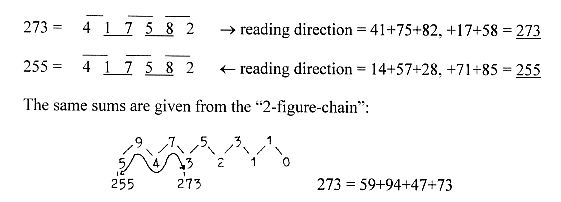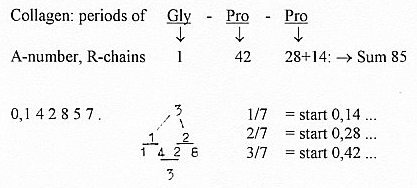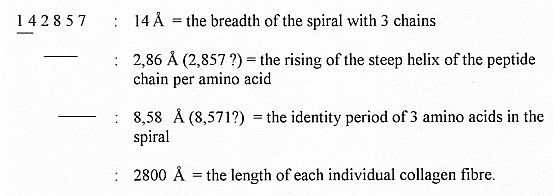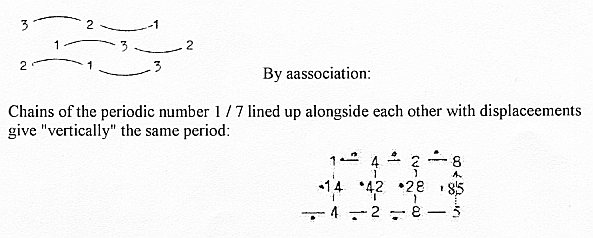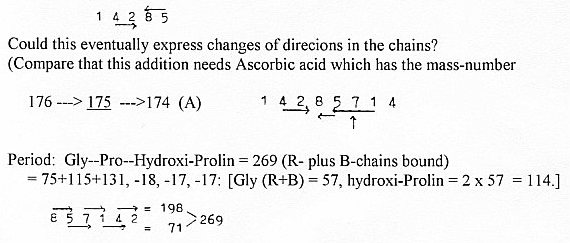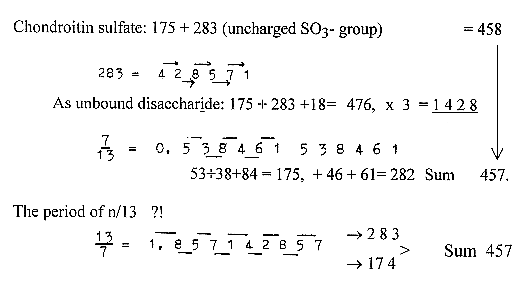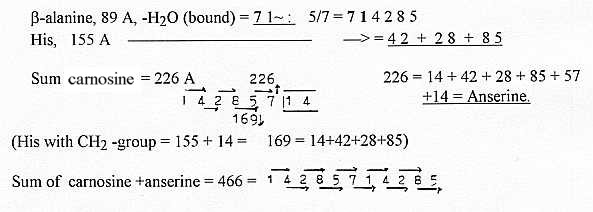The inversion of number 7, a periodic number-
as a mathematical principle behind the synthesis of fatty acids
- and collagen?
It is a fundamental assumption in this model that physics and
chemistry has a mathematical underground - a geometrical and arithmetic
one.
We can presume too that dimension degrees not
only represent and form the geometries but also generate numbers.
The cell-membrane could be seen as one of the
most essential conditions for life, an individualizing border.
And its most elementary structure as a border is made up of fatty
acids and glycogen.
Atoms as units has a parallel in cells as units
on the biological level, and cell-membranes could be interpreted
as an expression for the nuclear force in life chemistry.
What about 1/7 ?
7 /\ = 0, 14-28-57-14-28-57...
etc.
- The synthesis of fatty acids is a periodic one
as the periodic number of 1/7.
- The elementary molecules of the acids are CH2:
14 A, CH2-CH2:
28 A...
- According to the views of the String Theory we
should have 11 dimensions, with 7 of these dimensions "not developed", interpretable as inwards, and
curved - to compare with the function of a cell- membrane ?
- Compare number 7 as 4 + 3 in the superposed chain
of a dimension chain, see general
aspects on fatty acids.
(22 / 7 ~ π.
(Cf. 22: d-degree 2: 2a------1------2b, the form structure of
lipids.)
A fatty acid and the process of synthesis and mass numbers (A):
First step: An Acetyl-group (C2) at one binding
site binds to the middle C-atom of a Malonyl-group (C3) at another
site.
Following illustration is not correct. It should
imply that one H in the CH2-group of Malonyl~ virtually during
the moment of bond creation should be replaced by the Acetyl-group
(giving Malonyl~ number 85), before the Acetyl-group replaces
the bond to the COO--group of Malonyl~ , which gets
detached.
Instead: the rest of Malonyl~ without the COO-group
= 42. Added Acetyl~ 43 gives stage 85 A. After +2H, - H2O,
+ 2 H (= - 14) the sum gets 71, the C4-stage. Hence stages 42
- 85 - 71.
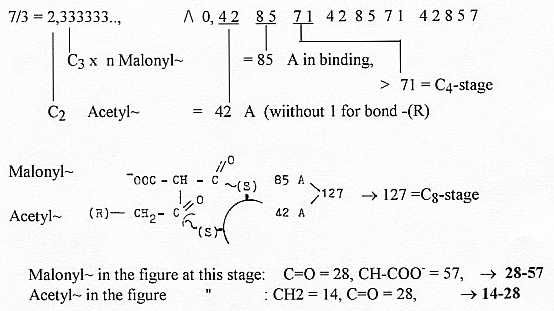
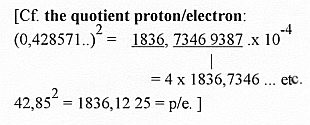
Mass numbers of two of the most common fatty
acids in animals:
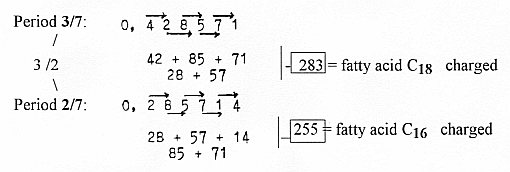
Observe: The CH2-CH2-groups (28 A) can also be derived
not from Acetyl¨but from the amino acid Ileu: side chain
57 A.
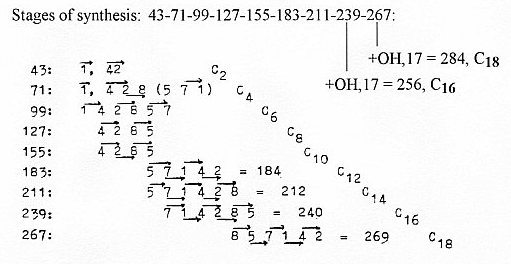
Triplet numbers:

824 + 571 = 1395
= sum of 9 stages in the synthsis to C18 bound.
And what should it imply, reading the periodic number
backwards (!)
- and parts of it too ? Mirror resonance in the underlying dimensional
patterns of vibrations in the complex rooms of the 7 hidden dimensions
of the String theory??
We can note that mirroring the 2-figure-readings
in the period 3/7 gives a relation between the two fatty acids
C16 and C18, uncharged and charged respectively:
Mean value of C16, C18 and C18:1 if charged = 819/3
= 273.
The period 28 57 14 mirrored:
Note: 273 = the mass number of the π+-meson
in e-, actor in the strong nuclear force. Cf. nuclear
force appearing in hydrophobic bonds of lipids creating closed
units as cells.
It's also the mean value of 2 amino acids unbound.
Coenzymes, some of them, in the synthesis and breakdown of fatty
acids:
Reading numbers backwards in endless periodic series
may of course be judged as mad. Only possible motive for it is
the assumption that numbers at bottom are connected with geometries
and opposite directions are essential geometrical features.
In the operation below this counterdirected reading
is combined with another "invention": the eventuality
that mass of molecules could be a combination of numbers which
are inversions of one another:
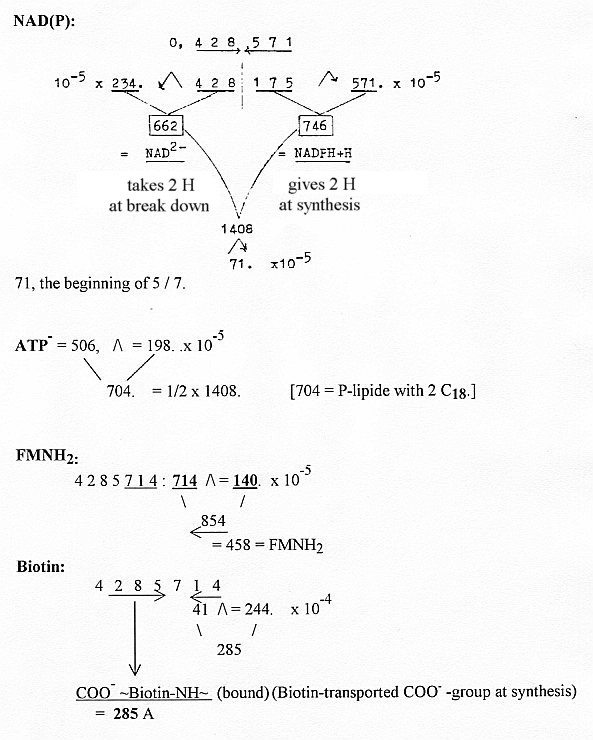
One lipid:

1/7 and Collagen:

The collagen fibres are made up of series of the
amino acids Gly - Pro - Pro:
(Sometimes Lys or Leu instead of a Pro.)
Why just these amino acids, in this order? Is
there any chemical explanation?
Their side chains (here called R-chains) has the
mass-(A-)-numbers
1 - 42 - 42, sum 85:
The "B-chains" of the amino acids, the
similar parts which combine through condensation in the peptide
bonds, have the mass number 74-18 = 56 = 14+42.
Strangely enough we also find such figures as from 1/7 in measures
of length and breadth of collagen in the entity Å (10-10
m):
The fibres line up alongside each other with 1/4
of a period length of displacement between them. (Numbers in the
figure below from the source PK):
In muscle fibres of parallelly arranged Myosin and
Actin filaments cross-links between actin and myosin are formed
when the muscles contract - as if actin was "climbing"
stepwise on the myosin filaments.
Could there eventually be a related mathematical
pattern of periodic numbers underlying this biochemically expressed
action?
After synthesis of the collagen chains, some side chains of Proline
get oxygen as additions: hydroxi-Pro. Mass number 42 +
16 = 58 A.
Elastin, another fibrous protein, is said to contain much
of the amino acids
Gly, Pro and Leu: The side chain of Leu has the mass number
= 57 A
Suppose we just add Leu to the series of collagen; we get:
4 R-chains of Lys 73 A (14+42+17) get ordered
in cross or ring formation: the group 14+17 are replaced by
1+28-group (aldehyde group) in 3 of the 4 chains. The Lys rests
get the mass value 71. Of these Lys rests following parts are
included in the ring formation: 42+29+42 = 113 = 14 + 28 + 57
+ 14. To this comes the 4th Lys rest NH3 = 17.]
Other molecules appearing added to collagen:
Ca10(OH)2(PO4)6
- crystals attached to collagen in bone tissue:
Mass-number = 1004 A = 4 x 251 = 4/3 x a collagen
period if with 3 chains
- Gly - Pro - Pro- = 251 A,
Triplet numbers of a dimension chain: 3 x 251
= 753 = 543 + 210.
1004 = = 2/3 x 1506: 543 + 432 + 321 + 210. Cf. sum of 24 amino
acids.
In connective tissue, cartilage and bone appears
Hyaluronic acid, a disaccharide x n with
a COO--group at one of the hexoses,
a group NH-CO-CH3 at the other.
(It is for instance found in the synovial fluid,
among other locations.)
Chondroitin sulphate, a disaccharide x n,
with a COO-group at one of the hexoses, and a SO3-group
+ NH-CO-CH3-group at the other.
(Much in cartilage.)
Hyaluronic acid, two disaccharides bound = 2 x 379
= 7 5 8 , uncharged.
Chondroitin sulphate: (if with uncharged SO3- group) = 175
+ 283 = 458:
283 = 42+28+85+57+71.
With periods 7/13 and 13/7:
Histamine and Serotonin, in connective tissue:
- Histamine from the amino acid His, 155 A, -COO = 111
A:
4 2 8 5...: 42 + 28 + 85 = 155
= His (Histamine = 111 = factor in the period 1/7)
- Serotonin from the amino acid Trp, 204 A, + 16,
-44 = 176 A, 175 charged.

In muscle fibres:
Carnosine and Anserine,
two peptides made up of β-alanine and
the amino acid His:
An energy storing substance:
Creatine phosphate, uncharged = 212 = 42 + 28 + 85 + 57
*
n/7-periods with factor 11 x 11 (1221) were
also investigated in relation to amino acids of the genetic code.
7 pages, still more extravagant or insane operations:
Amino acids and the period n/7, pdf
|





